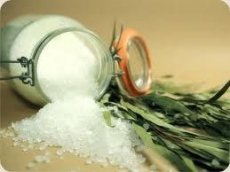New publications
Salt wars: scientists recommend consuming a teaspoon of salt a day
Last reviewed: 01.07.2025

All iLive content is medically reviewed or fact checked to ensure as much factual accuracy as possible.
We have strict sourcing guidelines and only link to reputable media sites, academic research institutions and, whenever possible, medically peer reviewed studies. Note that the numbers in parentheses ([1], [2], etc.) are clickable links to these studies.
If you feel that any of our content is inaccurate, out-of-date, or otherwise questionable, please select it and press Ctrl + Enter.

Doctors have warned for years that eating too much salt increases the risk of developing high blood pressure and other heart problems, but recent research challenges these hypotheses.
Despite scientists' claims that reducing salt intake reduces blood pressure, a large review of studies has found that cutting salt intake will have a negative impact on a person's overall health.
A recent study by scientists at McMaster University in Canada found that people who consumed moderate amounts of salt had the lowest risk of developing heart disease, while people who ate a high-salt diet had an increased risk of stroke, heart attack and other cardiovascular diseases.
At the same time, people who ate low-salt foods had a higher risk of dying from heart disease and an increased risk of being hospitalized for heart failure, the scientists wrote in the Journal of the American Medical Association.
"Our findings highlight the importance of reducing salt intake and the need to reduce the sodium content of processed foods that are high in salt," said Dr Salim Yusuf of McMaster.
"However, the question of the benefits of reducing salt in the diet remains open," he said.
The best way to answer that question is to conduct a large clinical trial, scientists say.
A teaspoon of salt
For the study, the researchers analyzed sodium and potassium levels in morning urine samples taken from 30,000 people in two clinical trials.
After about four years, 16% of the study participants had heart problems. The researchers then looked to see if salt intake was related to heart disease risk.
The study results showed that high salt intake (more than 8 g of sodium per day) had a negative impact on heart health, while low salt intake (less than 3 g of sodium per day) led to an increased risk of cardiovascular death and hospitalization for heart failure.
Researchers recommend consuming less than 2.3 grams of sodium daily, or 1.5 grams for people who are at high risk for developing high blood pressure or heart disease.
A teaspoon of salt, or about 5 grams, contains approximately 2.3 grams of sodium.
The researchers caution that the study's findings should be viewed with caution, as the study was based on a single morning urine sample.

 [
[